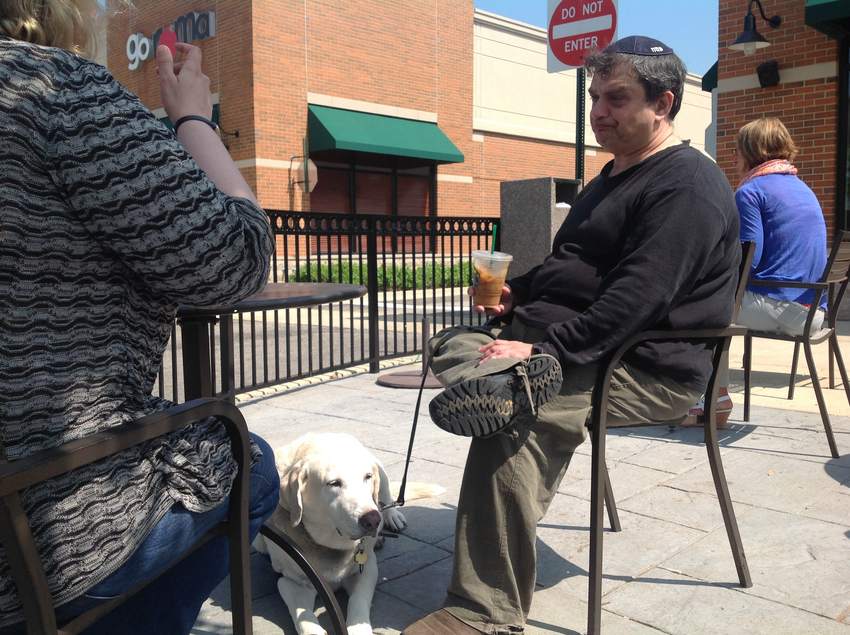By Denise Crosby Naperville Sun

World Trade Center first responder Philip Kirschner of Naperville with fiancée Jennifer Brower and service dog Jumper in Naperville. Denise Crosby, Sun-Times Media
After writing recently about putting our family dog to sleep, I heard from a lot of people who love their four-legged buddies just as intensely.
When I spoke with Philip Kirschner the day after we buried Lucy, he told me his golden Lab named Jumper is also struggling with a tumor in his abdomen. One thing I’ve learned: Cancer is hitting more of our dogs than ever before … 50 percent, according to stats.
But that’s another story.
This dog tale, as it turned out, is about the bond between Kirschner and Jumper — and how their health battles are so intertwined.
Jumper is a service dog for Kirschner, who struggles with his own myriad medical problems, some of which are likely the result of eight days of digging through the rubble at Ground Zero after the World Trade Center was destroyed on September 11, 2001.
The Brooklyn-born and raised paramedic/EMT who now lives in Naperville was one of the first responders when the Twin Towers came down and more than 3,000 lives were lost.
According to Kirschner, he had the day off and was with some of his team from St. Vincent Hospital at Howard Beach, preparing for a boating excursion, when the call came in.
Working about eight blocks away from the towers on that first day, Kirschner said he immediately began treating injured police officers and firemen, some struggling with respiratory problems, others who had suffered fractures or deep lacerations.
“I don’t remember a whole lot (of chaos) going on around me,” he said. “I was just trying to focus on the needs of the patients.”
That day would be the first of eight Kirschner said he spent at Ground Zero, pushing through rubble in search of, first, survivors, then for bodies and body parts.
He says he can still smell it. The burned flesh, rubber, aviation fluid, asbestos and dust.
“It was hard to breathe,” he said. “We were given some equipment to wear, but it was hot and cumbersome, so most of us didn’t wear it.”
I won’t go into the detail about what Kirschner says he witnessed, but when pushed for such details in an interview with Tamar Yonah on Israeli National Radio in 2011, he revealed memories that, no doubt, are why he still has nightmares today.
“We were debriefed after it all,” he said, “and it helped to be able to talk to others who were there. But I was trying to find answers to why … it was a struggle.”
Solace in faith
Kirschner said he eventually discovered solace in a return to his Jewish faith. He got a degree from Queens College and worked in IT, but continued as a volunteer with the Bed-Stuy paramedics in Brooklyn. And he proudly shows me a picture of him with this team in 2011 when they went to Haiti to help out with earthquake relief.
The physical problems he encountered were not so easily addressed.
“After 9/11 I was always sick … but I just ignored my health for years,” he said.
Kirschner said he was eventually diagnosed with cardiomyopathy and renal cancer, although both ailments could have been present before 9/11. He also developed what is known as the WTC cough, struggled with pneumonia, pulmonary hypertension, and sleep apnea.
And he’s convinced that even though his heart problems are likely genetic, the toxic fumes only exacerbated his precarious cardiac condition that now cause him to experience blackouts.
In 2007, he was given Jumper, a certified service dog, who is now 10 years old.
“I don’t know how he does it, but he starts to bark. And all of a sudden, my heart begins to race and the defibrillator kicks in …” said Kirschner. “He saved my life multiple times.”
Kirschner is now awaiting approval of his claim for compensation set up by the 2011 law that expands the 9/11 Victims Compensation Act to include first responders.
John Feal, founder of the FealGood Foundation and one of the leading advocates for this bill that set aside $4.3 billion for health care and compensation for these men and women, points out first responders after 9/11 came from all but five of the 435 congressional districts.
About 56,000 people registered, with 17,000 claims filed, said Feal, a firefighter [sic – Feal is a former iron worker] who lost his foot after 8,000 pounds of steel fell on him.
When only about 117 claims were processed by last December, he said he met with other officials to work through some of the issues, and since then, another 1,000 have gone out.
“It’s not great but it’s getting better,” Feal told me in a phone interview from his Long Island office. So far 58 types of cancers have been added to the list of ailments, and Feel [sic] expects to “see another wave of asbestos-related cancers that will hit in the next few years.”
Feal’s foundation has worked with Kirschner — “I understand his pain,” he said — and hundreds of other first responders who have struggled with serious health issues, including PTSD.
“Phil’s compensation will be coming,” Feal insisted. “But it’s hard when you have waited this long to tell people to be patient.”
Part of his frustration, Kirschner says, is having trouble being able to afford medical help for Jumper. His own health has made it difficult for him to get a job. He’s got plenty of financial issues himself as he tries to figure out where life will take him next.
But as is the case with so many dog lovers, his first concern is for Jumper. Like the first responders he’s worked with over the year, “He’s like a brother to me,” Kirschner said. “He’s like my other half.”

